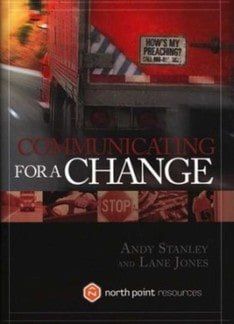This was a frustrating read. There is much that is good and helpful, but it is couched in a rather arrogant tone and fails to say anything helpful that hasn’t already been said by others.
It is a book of two halves. The first takes the form of a fictional narrative, written by Lane Jones. It concerns a disillusioned and frustrated preacher, who is given communicating coaching by one ‘Willy Graham’, a preacher and retired trucker. Unfortunately, the whole concept is far-fetched and implausible. As you begin the second half of the book, you are already in a sceptical frame of mind.
In the second half, Andy Stanley unpacks Willy Graham’s seven imperatives for effective communication. All of these are worthwhile. However, Stanley conveys them almost as if only every preacher followed his system, there wouldn’t be any problem with preaching.
There are underlying flaws in what Stanley writes. Firstly, there’s a lightness in his view of preaching. He talks of preachers being ‘performers’ and the need for turning sermons into storytelling. There is an absence of the solemn responsibility the preacher has in handling the inspired Scriptures.
His imaginary friend, Willy Graham, advises, ‘You need to carry on a conversation with your people. You need to pull up a chair and discuss the various topics that you want to cover’ (p.73) and, ‘I think you ought to get rid of your pulpit and set up a swing on your platform’ (p.75). The preaching principles he advocates (and even some of their rationale) could be applied equally to a stand-up comedian or entertainer. Additionally, Stanley claims that a call is not necessary for a preaching ministry and that it is acceptable to volunteer.
Secondly, he is disparaging of those who do not follow his approach and dismissive of the received wisdom of the greatest preachers down the ages. He sets up unnecessary dichotomies. For example, he dismisses the use of clear structure, alliteration and sermon points. He claims that such things are unhelpful if we really want to preach to change lives and aid people’s grasp of our message.
In another simplistic and false ‘either-or’ tension, he says that internalising your message must mean memorising your message: ‘until you can deliver it with no notes, from memory, then it is not your message’ (p.52); to use notes while asserting that what you are saying is of great importance is inconsistent. Mind you, he then goes on to say that his sermon introductions are so important that he often writes them down and reads them out!
Thirdly, Stanley’s approach to preaching comes over as listener-driven rather than Scripture-driven. I appreciate his desire to engage a congregation, but that is not the same as beginning with the authoritative Word of God and then seeing how it applies to his listeners.
He mocks preachers ‘spending months preaching through one of the epistles’, interpreting this as ‘ignoring what’s happening right in front of us’ (p.97). He says that he ‘weave(s) a message about sexual purity or money into just about every series we do’ (p.97). That’s fine and good if the biblical text is about those important issues, but absolutely not otherwise.
There is much about this book that is helpful, which is why I find it so frustrating. Stanley wants preachers to be focused, engaging and contemporary, but his arguments are flawed and his foundational premises unhealthy.
He is right to stress the importance of application and it is neglected in many books on preaching. But, while his diagnosis is correct, his prescription is dangerous. If you want good, solid, biblical help with application in your preaching then look to Michael Fabarez’ Preaching that changes lives,or Chris Green’s Cutting to the heart, or Jay Adams’ Preaching with purpose.
John Brand
Addiewell, West Lothian










